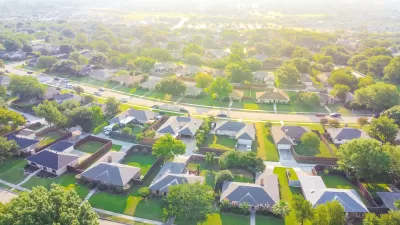As owners of valuable urban real estate, some churches are taking up the mandate to serve their community by using their vacant properties to provide housing for people being priced out of their homes.

A project that will provide 12 units of affordable housing on property owned by the Genesis Worship Center in East Oakland "is an early example of a wave of similar projects breaking ground at faith-based institutions across the country," writes Patrick Sisson in Reasons to be Cheerful. The $2.5 million complex "not only provides the church with another way of serving the community, but helps support the ministry during a trying time for urban churches."
Because they own and control their properties, "often located in the middle of residential areas," churches "are uniquely positioned to help solve the affordable housing crisis," writes Sisson. "A 2020 report by Berkeley’s Terner Center for Housing Innovation found roughly 38,800 acres of developable land in California owned by religious institutions, a combined plot the size of the city of Stockton, with 45 percent located in the state’s highest resource area (neighborhoods with lower poverty rates and greater economic and educational amenities) and 256 acres located near public transit."
To assist in the process, "a constellation of programs have taken shape to help other church leaders do what [Bishop] Matthews did, teaching them the ins and outs of development timelines, construction and housing regulations. The Bay Area chapter of the Local Initiatives Support Corporation (LISC), a nonprofit Community Development Financial Institution, runs a program that is investing $1 million to train religious leaders, connect them to developers and provide small grants to get them started." In California, "a bill that’s repeatedly been introduced and defeated in the state legislature, SB899, would give faith institutions the ability to build 100 percent affordable housing on their land “by right,” meaning they could skip the often onerous zoning approval process."
FULL STORY: Churches Are Becoming Players in Making Cities More Affordable

Alabama: Trump Terminates Settlements for Black Communities Harmed By Raw Sewage
Trump deemed the landmark civil rights agreement “illegal DEI and environmental justice policy.”

Study: Maui’s Plan to Convert Vacation Rentals to Long-Term Housing Could Cause Nearly $1 Billion Economic Loss
The plan would reduce visitor accommodation by 25% resulting in 1,900 jobs lost.

Planetizen Federal Action Tracker
A weekly monitor of how Trump’s orders and actions are impacting planners and planning in America.

Waymo Gets Permission to Map SF’s Market Street
If allowed to operate on the traffic-restricted street, Waymo’s autonomous taxis would have a leg up over ride-hailing competitors — and counter the city’s efforts to grow bike and pedestrian on the thoroughfare.

Parklet Symposium Highlights the Success of Shared Spaces
Parklets got a boost during the Covid-19 pandemic, when the concept was translated to outdoor dining programs that offered restaurants a lifeline during the shutdown.

Federal Homelessness Agency Places Entire Staff on Leave
The U.S. Interagency Council on Homelessness is the only federal agency dedicated to preventing and ending homelessness.
Urban Design for Planners 1: Software Tools
This six-course series explores essential urban design concepts using open source software and equips planners with the tools they need to participate fully in the urban design process.
Planning for Universal Design
Learn the tools for implementing Universal Design in planning regulations.
Caltrans
Smith Gee Studio
Institute for Housing and Urban Development Studies (IHS)
City of Grandview
Harvard GSD Executive Education
Toledo-Lucas County Plan Commissions
Salt Lake City
NYU Wagner Graduate School of Public Service





























